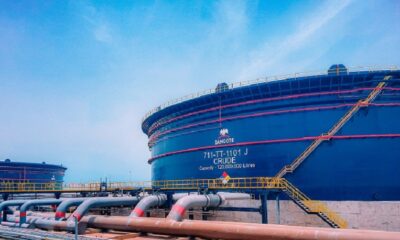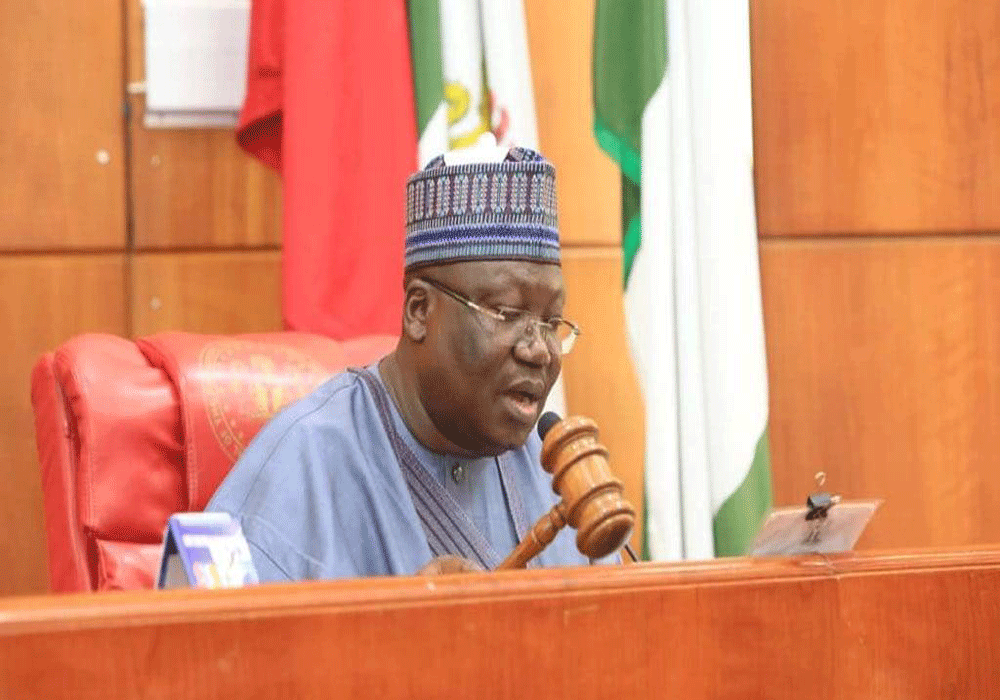Oil
Infrastructure projects, petroleum industry act lead in 2023 report on Nigeria

… OBG signs MoU with NIPC for new economic analysis
By Edozie Obasi-Eze
The opportunities for the private sector to play a part in Nigeria’s infrastructure development and support the expansion of key areas of industry identified as ripe for growth will be explored in a forthcoming report by the global research and advisory company Oxford Business Group (OBG).
The Report: Nigeria 2023 will highlight the sectors of the economy that are expected to drive recovery in the post-pandemic phase, with agriculture, services, and ICT among those analysed in detail.
It will also shine a spotlight on Nigeria’s energy sector, specifically the Petroleum Industry Act, which was signed into law in 2021, and the key role earmarked for the private sector in unlocking the new legislation’s potential.
With the African Continental Free Trade Area now established, the opportunities for Nigeria to forge new partnerships across the continent and boost intra-regional trade will be another focus.
OBG has signed a new memorandum of understanding (MoU) with the Nigerian Investment Promotion Commission (NIPC). Under the agreement, the NIPC will team up with OBG to produce The Report: Nigeria 2023, alongside other related content.
The MoU was signed by Emeka Offor, Director for Human Resources Management, NIPC, and Wen Qian Chang, Country Director, OBG.
Commenting after the signing, Offor said Nigeria offered a wide range of opportunities for the global investment community, with the government keen to bring the private sector on board for a pipeline of infrastructure projects and the construction of new homes, alongside numerous other collaborative initiatives.
READ ALSO: Jigawa Emerges best state in COVID-19 vaccination in north west zone
“Oxford Business Group is known for producing high-level, in-depth reports on emerging economies that contain the sectoral and industry-specific statistical data and information that enables investors to make informed decisions,” he said. “I’m delighted that we will be working with the Group’s representatives to identify and highlight the many openings in Nigeria for business leaders as the country navigates its post-pandemic recovery.”
Welcoming the NIPC on board, Wen Qian Chang, said the 2023 report came at a critical time for Nigeria, with key macroeconomic challenges still an issue and national elections approaching.
“Inflation and unemployment both remain a cause of concern for Nigeria. However, higher oil prices and rising remittances point to a bright outlook,” she said. “The Nigerian Investment Promotion Commission has long played a key role in attracting investment to the country, spearheading efforts to enhance the business environment and providing a one-stop hub for investors. I’m thrilled that we will benefit from their local knowledge and expertise as we begin work on this important project.”
The Report: Nigeria 2023 will be produced with the NIPC, the Lagos Chamber of Commerce and Industry and Precise Platforms. It will mark the culmination of more than a year of field research by a team of analysts from Oxford Business Group. The report will be a vital guide to the many facets of the country, including its macroeconomics, infrastructure, banking and other sectoral developments. OBG’s publication will also contain contributions from leading representatives across the public and private sectors.
The Report: Nigeria 2023 will be available online and in print. It will form part of a series of tailored studies that OBG is currently producing with its partners, alongside other highly relevant, go-to research tools, including ESG and Future Readiness reports, country-specific Growth and Recovery Outlook articles and interviews.
Oil
NNPC Targets 60% Methane Emission Reduction By 2031
The Nigerian National Petroleum Company Limited (NNPC) has unveiled a bold strategy to reduce methane emissions in the oil and gas sector by 60% by 2031, with an ultimate goal of achieving net-zero emissions by 2060.
This announcement reinforces Nigeria’s leadership role under the Global Methane Pledge initiative and its commitment to tackling climate change.
The Group Chief Executive Officer of NNPC, Mele Kyari, disclosed these plans during a meeting on Thursday with Robert Leahman, the U.S. State Department’s Global Methane Program Manager, and a delegation from Deloitte.
READ MORE: Atiku Gloats Over AUN’s Achievements Ahead Of 20th Anniversary
The discussions, held at the NNPC Towers in Abuja, focused on collaborative efforts to reduce methane emissions through innovative and sustainable practices.
“Reducing methane emissions is not just an environmental necessity but also a strategic imperative for Nigeria’s energy transition. We are leveraging partnerships to adopt global best practices and innovative solutions,” Kyari stated.
Key among these efforts is a pilot project in the Niger Delta, aimed at establishing emissions baselines, mitigating methane leaks, and promoting sustainable operations across Nigeria’s energy sector.
The project, a partnership between NNPC, Deloitte, and the U.S. Bureau of Energy Resources, will utilize data-driven methodologies to pinpoint and address methane hotspots.
Robert Leahman commended Nigeria’s proactive stance, describing it as a benchmark for other nations on the continent.
“Nigeria’s leadership under the Global Methane Pledge sets a standard for the continent. These initiatives will not only help reduce emissions but also drive sustainable development in the energy sector,” he said.
Kyari highlighted the broader benefits of addressing methane emissions, noting its significance for both environmental protection and economic efficiency.
“This collaboration is a game-changer. By addressing methane leaks, we’re reducing waste, saving costs, and protecting the environment. It’s a win-win for our economy and the planet,” he added.
Oil
FG Introduces New Incentives To Revitalize Nigeria’s Oil & Gas Industry
In a strategic move to revitalize Nigeria’s oil and gas sector, the Federal Government has unveiled two key fiscal incentives aimed at attracting investment and enhancing energy security.
The announcement was made by Mr. Wale Edun, the Minister of Finance and Coordinating Minister of the Economy on Wednesday.
The first initiative, the Value Added Tax (VAT) Modification Order 2024, introduces critical exemptions for essential energy products and infrastructure, including Diesel, Feed Gas, Liquefied Petroleum Gas (LPG), Compressed Natural Gas (CNG), Electric Vehicles, Liquefied Natural Gas (LNG) infrastructure, and Clean Cooking Equipment.
Read Also: Atiku Calls For Rotational Presidency Across Nigeria’s Geopolitical Zones
These exemptions are designed to reduce living costs for Nigerians, promote energy security, and accelerate the transition to cleaner energy alternatives.
The second initiative, the Notice of Tax Incentives for Deep Offshore Oil & Gas Production, offers new tax relief options for deep offshore exploration projects.
This measure aims to position Nigeria’s deep offshore basin as a premier destination for international oil and gas investments, boosting the country’s appeal to foreign investors.
These reforms are part of a broader set of policy initiatives, known as Policy Directives 40-42, endorsed by President Bola Ahmed Tinubu.
The directives reflect the administration’s commitment to fostering sustainable development in the energy sector and enhancing Nigeria’s competitive edge in the global oil and gas market.
Business
Tinubu set to approve ExxonMobil-Seplat oil deal, expands CNG bus initiative

By Yemie Adeoye
NIGERIA’s President Bola Tinubu has announced that the protracted ExxonMobil-Seplat upstream oil divestment will be formally approved by the Minister of petroleum within a matter of days, just as he announced his government’s intention to expand the Compress natural Gas, CNG buses initiative.
The President who stated this during his Independence day nationwide broadcast stated that the move is in line with his administration’s commitment to free enterprise, free entry and free exit in investments which is the hallmark of his administration investment policy.
“Fellow compatriots, our administration is committed to free enterprise, free entry, and free exit in investments while maintaining the sanctity and efficacy of our regulatory processes. This principle guides the divestment transactions in our upstream petroleum sector, where we are committed to changing the fortune positively. As such, the ExxonMobil Seplat divestment will receive ministerial approval in a matter of days, having been concluded by the regulator, NUPRC, in line with the Petroleum Industry Act, PIA. This was done in the same manner as other qualified divestments approved in the sector.”
The President also seized the opportunity to plead with Nigerians to be patient with his administration’s reform policies. “As your President, I assure you that we are committed to finding sustainable solutions to alleviate the suffering of our citizens. Once again, I plead for your patience as the reforms we are implementing show positive signs, and we are beginning to see light at the end of the tunnel”.
“Our energy transition programme is on course. We are expanding the adoption of the Presidential Initiative on Compressed Natural Gas for mass transit with private sector players. The Federal Government is ready to assist the thirty-six States and FCT in acquiring CNG buses for cheaper public transportation.
Fellow Nigerians, while we are working to stabilise the economy and secure the country, we also seek to foster national unity and build social harmony and cohesion. Our economy can only thrive when there is peace”. he enthused.

















